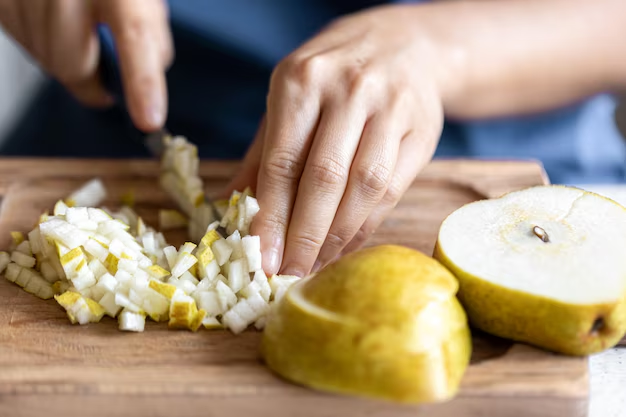Can Diabetics Enjoy Pears as Part of Their Diet?
Navigating the world of dietary choices with diabetes can often feel like walking a tightrope. With constant information and a wide array of foods to choose from, it can be challenging to figure out what's truly beneficial. Among the fruits often debated in the diabetic community are pears. Known for their sweet and juicy nature, are pears a good option for someone managing diabetes? Let's delve into this delicious topic and unpack the benefits, potential considerations, and the best way to incorporate pears into a diabetic-friendly diet.
Understanding Pears and Their Nutritional Profile
The Sweet Appeal of Pears
Pears are not only delicious but also boast a unique versatility in the kitchen, complementing both sweet and savory dishes. Their popularity isn't just about flavor; it's also the health benefits they offer. Pears provide vital nutrients and fiber, making them a substantial dietary component.
Nutritional Breakdown
Pears are loaded with essential nutrients, including:
- Fiber: Known for aiding digestion and promoting a feeling of fullness.
- Vitamins: Such as vitamin C, which supports immune function.
- Antioxidants: These help combat oxidative stress and inflammation.
- Minerals: Like potassium, which plays a role in heart health.
A medium-sized pear typically contains around 100 calories, making it a light yet satisfying snack option. Notably, the skin is a significant source of fiber and antioxidants, highlighting the importance of consuming the fruit whole.
Glycemic Index and Load
The glycemic index (GI) measures how quickly carbohydrate-containing foods raise blood glucose levels. Foods with a low GI are better for maintaining steady blood sugar. Pears have a low GI, meaning they cause a slower, more gradual rise in blood sugar. In addition, they have a low glycemic load, further making them a considered choice for those monitoring their blood glucose levels.
Benefits of Pears for Diabetics
The Fiber Advantage
One of the standout features of pears is their high fiber content. Fiber can be a game-changer for individuals with diabetes as it helps regulate blood sugar levels. By slowing digestion, fiber facilitates a more measured absorption of glucose into the bloodstream, thus preventing spikes.
Promoting Weight Management
Including high-fiber fruits like pears in your diet can also assist with weight management. Since fiber promotes satiety, it can help reduce overall calorie intake naturally. Maintaining a healthy weight is crucial in managing diabetes, as it improves insulin sensitivity and control.
Heart Health Perks
People with diabetes are often at increased risk of heart disease. The good news? Pears are heart-healthy. The presence of potassium and antioxidants in pears supports healthy blood pressure and reduces inflammation, which are key components of cardiovascular well-being.
Potential Considerations
While pears are generally favorable for diabetics, there are important considerations to bear in mind to ensure balanced blood sugar control.
Portion Sizes Matter
Like all carbohydrates, portion size is vital when consuming pears. Moderation is key — enjoying a medium pear as a snack is a tasty and balanced choice.
Whole, Not Processed
Whenever possible, opt for whole, fresh pears. Processed forms, like canned pears or pear juice, often contain added sugars or have lower fiber content, impacting your blood sugar levels more significantly.
Allergies and Individual Reactions
Some individuals might experience allergic reactions to pears, particularly those with birch pollen allergies. It’s essential to monitor how your body responds and consult a healthcare professional if adverse reactions occur.
Adding Pears to Your Diet
If you’re ready to incorporate pears into your meal plan, here are some creative and diabetes-conscious ways to do so:
Snacking Smart
A medium-sized pear, when enjoyed as a standalone snack, provides a satisfying boost without unwanted sugar surges.
Tossed into Salads
Add pear slices to a salad for a dash of sweetness. Combine them with leafy greens, nuts, and a sprinkle of cheese for a delicious and nutritious meal.
Breakfast Bowl Add-ins
Chop pears into your morning oatmeal or yogurt. This not only enhances flavor but also adds nutrients and fiber to your breakfast.
Cooking and Baking
Pears make an excellent ingredient in cooked meals, from baked pears with cinnamon to grilled versions that accompany savory dishes.
Here's a quick summary to remember:
🍐 Pears and Diabetes: What You Need to Know
- 🍏 High-fiber Content: Aids in blood sugar regulation.
- 🍽️ Portion Control: Enjoy in moderation to maintain balanced blood sugar.
- 🍎 Whole Over Processed: Choose fresh pears for maximum benefits.
- 🌱 Versatile in Diet: Great in salads, snacks, and breakfast bowls.
Final Insight
Incorporating pears into your diet can bring numerous benefits, particularly for individuals managing diabetes. Thanks to their fiber content, low glycemic index, and versatility, pears can easily complement a balanced meal plan. Remember, moderation and thoughtful pairing with other nutrient-dense foods are key to maintaining steady blood sugar levels. By choosing whole, fresh, and unprocessed pears, you can relish their natural sweetness while supporting your health goals.
Ultimately, it's essential to tailor dietary choices to your individual health needs and consult with healthcare professionals as necessary. Pears, when enjoyed as part of a balanced diet, can indeed be a delicious ally in your journey to managing diabetes effectively.

